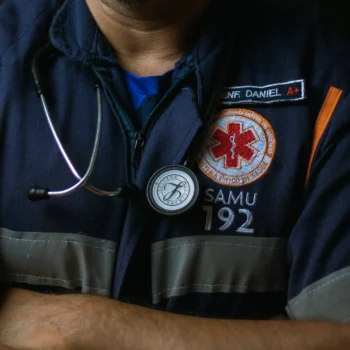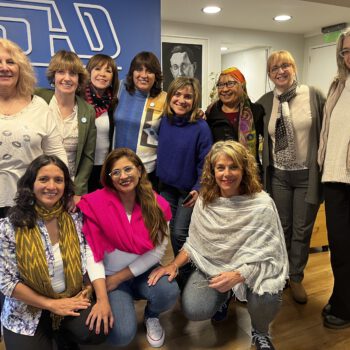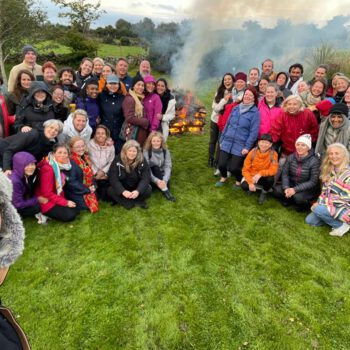Stephen Brown is an Irish practitioner of Compassionate Inquiry,® Internal Family Systems, Somatic Experiencing and Gestalt. His Four Pillars of Connection include: Connection with Self, Connection with Community, Connection with Environment, and Connection with “something greater than”. His retreats in Ireland, the Sahara Desert and Bali include nature, adventure, ceremony, and ritual.
Grounding Facts:
In 2024, more than 90% of schools in the north of Ireland are still segregated by religion. Catholics and Protestants are educated separately from the ages of four to eighteen. Mental health problems are the single largest cause of ill health and disability. One in five adults has experienced a mental health problem and, prior to the pandemic, one in eight children had an emotional difficulty indicating psychological distress. A Queen’s University study showed that ~39% of the study population has experienced a conflict related traumatic event.
This post references a short excerpt of Stephen’s story of growing up during the Troubles, in the north of Ireland. Listen to his full interview on The Gifts of Trauma Podcast.
The north of Ireland has been an area of conflict for centuries. Today it is still suffering from the traumatic aftermath of the Troubles: a 40 year period of violence, bombing, segregation and separation that kept people in constant states of confusion, fear and vigilance.
As a child of the 70s, the Troubles taught me that Protestants (Unionists) are bad, Catholics (Nationalists) are good. That level of sectarianism was pervasive, not just in our schooling, it dictated where we worked, lived, socialized, shopped and played.
I’ll never forget the first time I traveled alone to Belfast. I was 17, and when I got off the bus, I saw red, white and blue everywhere. Union Jacks were painted on the roadside kerbs. This is tribal marking. Areas in cities, towns and villages were marked with specific colors and icons to show their allegiance. As a young Catholic, these markings told me I was in the wrong part of Belfast. I was shit scared, as I knew this area wasn’t safe for me. I feared I’d be beaten, shot, or killed.
Growing up in a Catholic Nationalist area in the north of Ireland, I attended a Catholic primary school, mixed (Catholic / Protestant) and Catholic secondary schools. The mixed school I attended was on the outskirts of my town, but getting there wasn’t easy. I wasn’t allowed to walk, because the route to school cut through a nationalist area. We took buses, which were often stoned. At school, stoning, bomb scares and evacuations occurred regularly, evoking life or death sensations.
On one level, I was a Catholic, growing up in a Catholic town, but on another, I was mixing with the Protestant community in secondary school. My parents created integration, and its cost was vigilance; discerning where to go and not to go, what to say and not to say, where to look and not to look, who to look at and not to look at. So my nervous system was constantly searching for safety. I had to know who I was speaking to, and where they were from, to discern if they were safe. When going to a party or to someone’s house, I’d have to find out: What area is this? How am I getting in there? How am I getting out?
I remember being asked by an adult, at 8 years of age, “Who are the good guys, the police or the IRA?” I don’t know how I knew, but my answer was, “The IRA.” It was the right answer for that person. Maybe I had an intuitive knowledge of what to say to somebody to keep them right, because I don’t recall learning this. Somehow it was already there.
The IRA, the Irish Republican Army were the defenders of the Nationalists, so to the Irish people, the Catholics, they were the good guys. To others, they were terrorists. The UVF, the Ulster Volunteer Force, and the UDA, the Ulster Defense Association were the defenders of the Protestants and Unionists.
Being able to navigate these different worlds, to read people and see what was needed to make everything okay certainly enabled me to integrate and support and move with people, which has served me well over the last 30 years. Ultimately, my experience in different schools and communities supported my work with marginalized Catholic and Protestant at risk youth.
In global conflicts, even in family, community and organizational conflicts, there are so many opposing sides and ideas. My teen experiences helped me see that there’s never one story, or one truth. It doesn’t matter if I believe something is true. Somebody else can have the exact same level of belief in their truth, which doesn’t mean they’re wrong. I can look up who did this and who did that. But the bottom line is that everyone lives with their truth, with what’s right for them.
Growing up in the Troubles put us in states of heightened tension, whether we knew it or not. That’s just how we’ve lived here for a long, long time. Even if we were somewhat shielded, we still knew to be on the lookout for certain things, not to go to certain places, say certain things, do certain things or be with certain people.
Today, we’re 30 years post conflict, but we still have conflict. It’s not the same. We don’t have the murders and the bombs. It’s a much different country today, but there are still conflicts, still bitterness between communities. There is so much, “I’m not wanted” in both communities. “There’s something wrong with me” is a core belief within us. Many things in our childhood gave rise to that belief. We wanted to be part of something that we couldn’t be part of. Neither side belongs anywhere, yet both are fighting in different ways to belong somewhere. In truth, nobody really knows what they’re fighting for today.
When we’re disconnected from ourselves, from community and environment, when we’re not connected to something greater than ourselves, and we’ve lived through fear and conflict and segregation and separation, it all gets very tight, tense and restricted. Our views get very limited.
Compassionate Inquiry® is about having more compassion, more understanding, of both what’s
going on for me and the other. Opening up this awareness offers great hope for how we show up
in the context of the north of Ireland.
– – –
The Gifts of Trauma is a weekly podcast that features personal stories of trauma, healing, transformation, and the gifts revealed on the path to authenticity. Listen to the interview, and if you like it, please subscribe and share.




Comments are closed.